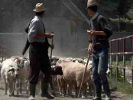Eye For Film >> Movies >> Off The Beaten Track (2011) Film Review
Off The Beaten Track, is a film which utilises the simple pleasures and power of the image, relegating our traditional desires for information firmly to a backseat. Director Dieter Auter makes no attempt to introduce his documentary, nor its protagonists, to the audience. The film opens with a meeting of farmers in rural eastern Europe. They complain about the lack of subsidies and grants given to them, and discuss their options for the coming season. This is all we have to go on for some time.
There is no voiceover explaining the significance of this particular group of people or what’s so unique about their story. There are no subtitles giving names and titles of the people we see on screen. There are no interviews with anyone. Instead, the film quietly and confidently draws us in to the lives of one particular family of shepherds, and their ordinary struggle for survival. With no guided narration, instead Auter follows the family’s day-to-day routine for a year. We hungrily consume any loose talk that comes our way. Mirel and Albin are brothers, working relentlessly with sheep that ‘never sleep’, to provide for their tight-knit family unit.

Scenes play out in the austere landscapes of, what we eventually learn to be, Romania. Farming sheep does not provide enough of a living for Albin and his family any more, and from another snippet of conversation, greedily devoured, we discover that his mother has left the family to work in Germany for a period of time. Having only joined the EU in 2007, Albin’s mother is only a small part of the huge transient workforce who leave Romania to earn considerably more money in other parts of the EU.
There are certainly everyday hardships to be witnessed in the film, but what really captivates, and makes the lack of a real issue-driven narrative seem insignificant, is the endearing nature of the protagonists themselves and their everyday routines. They may be haggling at a local car dealership, trying to trade sheep for a new set of wheels; or Albin may be studying hard for his driving test, completely bemused by a trip to a busier village with a roundabout; or even just the simplicity of Albin’s mother knitting him a new vest for the winter. There is always a smile and a joke, come what may, and the close family bond is genuinely touching.
It does, however, make the family’s austere hardships all the more poignant. They chase a lorry down their village road, begging them to buy lamb. Albin’s mother departs again for Germany, leaving him in tears. However, this time she brings back wondrous luxuries, including several jars of Nutella, bottles of Lenor and a vacuum which has Mirel suitably baffled (‘it’s like a lawnmower and has wheels like a car’).
The film ends with no conclusions, nor would it want to draw any. Life will go on for the shepherds, whether we are witness to it or not. But that’s precisely what is so brilliant - we are witness to it. Opening a window in to an ordinarily hidden corner of the world, into the lives of people we would never have come across otherwise, Auter’s film is really trying to engage with the simple questions of everyday existence, with a much more complex discussion on globalisation and transparent boundaries looming in the background. One thing is certain: the incessant bleating of sheep will be muddling my dreams for some time to come.
Reviewed on: 28 Jun 2011

















